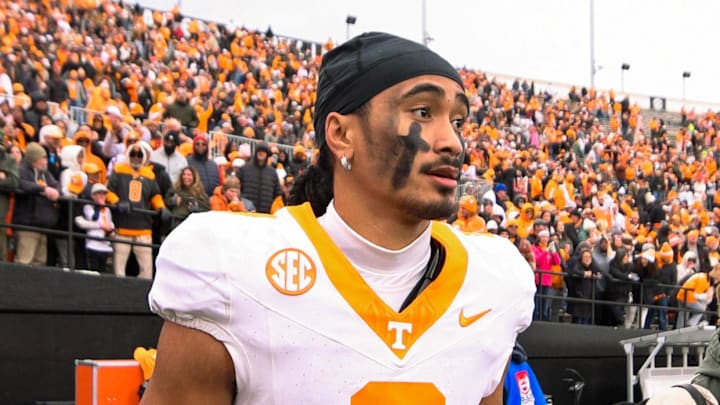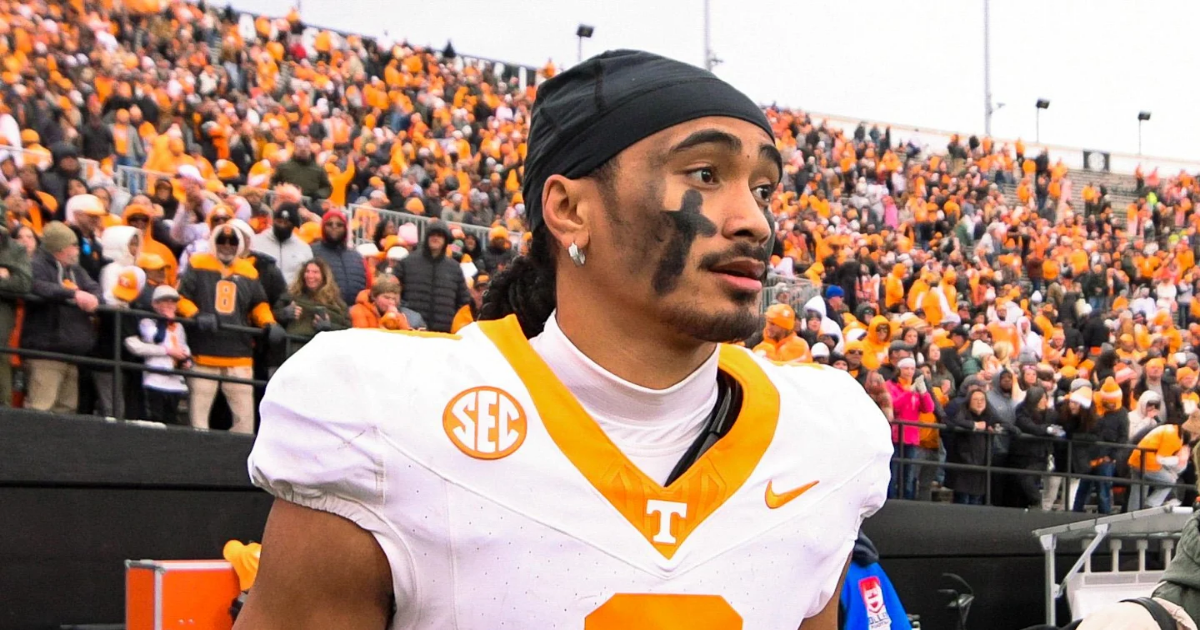
Iamaleava announced his commitment to UCLA on Sunday. / Steve Roberts-Imagn Images
As the story goes, the mother of a high-level teenage basketball player was shopping her son to college programs for $150,000. This was roughly 15 years ago, when such deals were very much against NCAA rules and very much commonplace for elite prospects. She went into the office of one of the top coaches in the country and made her demand.
The coach’s response: “You’re trying to get $150,000 for your son. I’m trying to help him earn $50 million in the NBA. Why are you selling him short?”
The mom didn’t get her $150,000 from that coach, and that coach didn’t get the player. After a successful college stint, the player has logged more than a decade in the NBA, where his career earnings have eclipsed the $50 million mark. The college coach kept winning. It ended up working out O.K. for all involved parties.
That story came to mind while the Nico Iamaleava drama played out. The quarterback left the Tennessee Volunteers earlier this month and landed with the UCLA Bruins on Easter Sunday. The affair has led to much gnashing of teeth and rending of garments in the college sports universe.
Maybe, over time, Iamaleava’s transfer will work out for everyone, too. Maybe he will flourish as a player and UCLA will improve as a program and Tennessee will keep winning at a College Football Playoff level with whoever its 2025 starting QB will be. That’s all possible.
But for now, it looks like Iamaleava’s camp sold Nico short, trying to turn a quick buck instead of playing the long game. In the process, the quick bucks might be less than what he was making at Tennessee, and the hit to his reputation could be more costly than that.
SIP May NFL Draft Preview. Sports Illustrated’s 2025 NFL Draft Preview. dark. BUY NOW
Commoditizing a kid at an early age is often a prelude to sad outcomes. The world of youth sports is full of parents and advisers (and now agents) who think they’ve found a smarter way, easier path or quicker fix. Most of them haven’t. The shortcut to success often becomes a trail into the wilderness.
As of now, nobody needs to weep for Iamaleava, who has reportedly made around $6 million in the first three years of his contract with Tennessee. He will still be well-paid at UCLA, even if the new salary is less than the $2.2 million he was slated to earn in Knoxville. If he doesn’t blow the money he’s already made, he’s on his way to being set for life.
But his career to date has seemed to revolve around transactions, not long-term growth. If the ultimate goal is to position him for professional success and generational wealth in the NFL—while also enjoying his college experience and perhaps even earning a degree—this is a curious way of getting there.
Iamaleava’s original dealings with Tennessee ran afoul of several NCAA rules that could have led to eligibility problems and major sanctions against the program. It took a ride to the rescue from the Tennessee attorney general and a court ruling to halt an NCAA investigation and essentially disarm the association’s rulebook. It worked out in the end, but there was considerable risk in entering college with that deal.
Iamaleava followed that up with a good, not great, first season as a college starter. The two biggest reasons the Volunteers went 10–3 in 2024 were their defense (which ranked second in the SEC) and running back Dylan Sampson (who ranked first in the league in rushing). Iamaleava’s pass efficiency rating of 145.34 was the lowest of any Tennessee starter in coach Josh Heupel’s four seasons.
With that as context, reportedly asking for more money back in December was a brazen move, even if the market suggests Iamaleava was now underpaid. Telling Heupel he needed to change his offense to better suit Iamaleava was downright insulting. And whatever happened at the tail end of Tennessee’s spring camp was a fiasco.
Iamaleava was an unexpected and unannounced absence from practice on April 11, the day before the Vols’ Orange & White spring game. This was initially described in media reports as a holdout—he wanted to be paid like some other QBs who got huge deals this offseason, most notably Miami’s Carson Beck, who came from Georgia for a reported $4 million. Tennessee wasn’t interested in paying that amount.
(Iamaleava’s camp has subsequently said he’d already decided to transfer and was not trying to leverage a raise out of Tennessee.)
Either way, it was a bad look that enraged fans—and not just Tennessee fans. Many followers of college sports still haven’t come to grips with the reality of athletes being paid. Many more dislike the constant transferring in search of additional cash. And the number who will countenance an actual holdout is smaller still.
Not surprisingly, the situation quickly reached the untenable stage. Iamaleava had to go, whether voluntarily or at the request of Tennessee. We’ll see whether UCLA is a solution or simply the next way station.
If Iamaleava wants to win, this is a step down. The Bruins are coming off a 5–7 season that got better as it went along, but they have a massive uphill climb in an 18-team Big Ten that has won consecutive national championships.
If Iamaleava wants to shine in a high-powered offense, that’s also a challenge. UCLA averaged 18.4 points per game last season, 126th in the nation, and while it has added a likely rising star coordinator in Tino Sunseri, the talent level is not suddenly at an Ohio State level.
If Iamaleava wants to convince the NFL he will be worthy of a first-round pick in 2026, he’s created some obstacles for himself. Walking out on a program will lead to questions about commitment. If things go poorly at UCLA, is he going to persevere? Will he be playing with one eye on his draft stock, looking for an injury excuse to shut down a struggling season? Can he elevate a program, or just take advantage of one?
As for UCLA: There is some considerable swallowing of pride here. The Bruins were stiffed on signing day in December by none other than Madden Iamaleava, Nico’s younger brother, who flipped a UCLA commitment to sign with the Arkansas Razorbacks. Perhaps the desperate need for a playmaking quarterback can override any lingering trust issues.
Again, this may work out for all involved parties in the fall. But for the moment, everything around Nico Iamaleava seems diminished—his program affiliation, his salary, his reputation. It’s now up to him to transform short-term transactions into something of lasting value for himself.
